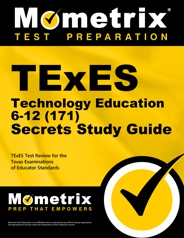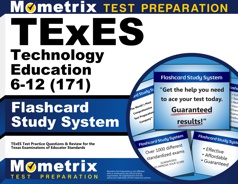The TExES Technology Education 6-12 exam is an assessment test designed to test the knowledge of entry-level educators in the state of Texas.
Click “Start Test” above to take a free TExES Technology Education 6-12 practice test, and check out our premium-quality TExES test prep resources by clicking the links below!
TExES Technology Education 6-12 Exam Outline
The TExES Technology Education 6-12 exam contains a total of 100 selected-response questions, and you will be given 4 hours and 45 minutes to complete it.
Teaching Standards
The TExES Technology Education 6-12 exam is aligned with seven standards for educators that have been outlined by the State Board for Educator Certification.
Click the button below to see the full list of approved educator standards:
Approved Educator Standards
Standard I: You are expected to understand the philosophy of technology education.
Standard II: You are expected to understand the nature of technology.
Standard III: You are expected to understand the interactions between technology and society.
Standard IV: You are expected to understand technology and design processes.
Standard V: You are expected to understand the use, maintenance, and impact of technology.
Standard VI: You are expected to understand communication; manufacturing; construction; energy, power, and transportation; bio-related technology; and computer applications systems.
Standard VII: You are expected to understand instructional development and facilities management.
Exam Domains
The exam is split into six domains, each of which covers one or more standards mentioned above.
| Domain | Percentage of Exam | Standards Used |
|---|---|---|
| 1. Fundamentals of Technology Education | 17% | I-VII |
| 2. Communication | 14% | VI |
| 3. Manufacturing | 17% | VI |
| 4. Construction | 17% | VI |
| 5. Energy, Power and Transportation | 17% | VI |
| 6. Biotechnology and Computer Technology | 17% | II and VI |
1. Fundamentals of Technology Education (17%)
For the questions in this domain, you will be tested on your knowledge and abilities in the following areas:
- The nature and philosophy of technology and technology education
- Interactions between technology and society
- The design process and its application in technology
- Uses and impacts of technology
- Techniques for maintaining technology systems
- Planning, producing, and managing a technology systems project
- The philosophy of technology education
- Developing and implementing a technology education program
- Planning, managing and maintaining technology education facilities
2. Communication (14%)
For the questions in this domain, you will be tested on your knowledge and abilities in the following areas:
- Drafting
- Equipment and techniques used in graphic design, photography, and image transfer and reproduction
- Video and audio systems, production techniques, and equipment
- Electronic communication
3. Manufacturing (17%)
For the questions in this domain, you will be tested on your knowledge and abilities in the following areas:
- Types of manufacturing systems
- The organization, structure and management of manufacturing enterprises
- The principles of product development and of the application of economic and marketing principles to manufacturing
- Using tools and equipment in manufacturing
- Materials used in manufacturing
- Manufacturing processes and quality control procedures
4. Construction (17%)
For the questions in this domain, you will be tested on your knowledge and abilities in the following areas:
- Types of construction projects
- Planning procedures
- Surveying and preparing sites for construction projects and postconstruction activities
- Applying engineering principles to construction projects
- Using hand and power tools in construction
- Construction materials and their properties
- Building, maintaining, and repairing structures
5. Energy, Power and Transportation (17%)
For the questions in this domain, you will be tested on your knowledge and abilities in the following areas:
- Scientific concepts related to energy and power
- Issues related to energy consumption and conservation
- Characteristics of thermal, electrical, fluid, and mechanical power systems
- Methods of control, transmission, and storage of energy and power
- Principles and applications of electronics
- The design and use of vehicles and vehicular subsystems
- The characteristics of land, air, water, and space transportation systems
6. Biotechnology and Computer Technology (17%)
For the questions in this domain, you will be tested on your knowledge and abilities in the following areas:
- The role of biotechnology in business, industry, and society
- Principles of bio-related technologies
- Basic principles related to computer technology
- Appropriate and effective uses of computer technology
Check Out Mometrix's TExES Technology Education 6-12 Study Guide
Get practice questions, video tutorials, and detailed study lessons
Get Your Study Guide
Exam Registration
To register for the exam, you must create an online NES account via their website. Once your account has been created, you can use it to register for the exam and schedule an exam date. When you register, you will need to pay the $116 examination fee.
How to Study
Think you aren’t a good test-taker? Maybe on a study-time crunch? Or just don’t know how to begin studying? Mometrix has designed a new Study Secrets course to help every student, no matter what study scenario you are in. Here’s what you’ll find in the Study Secrets Course:
- Techniques to Conquer Procrastination
- Steps to building a Study Plan custom to your learning style
- 7 Effective Note-Taking Methods
- Test-Taking Tips
- Memory Techniques and Mnemonics
- And much more!
Everyone learns differently, so we’ve tailored our Study Secrets Course to ensure every learner has what they need to prepare for their upcoming exam or semester. Click below to check it out!
Test Day
On exam day, you should arrive at the testing center 15-30 minutes early on the day of your testing appointment. Upon arrival, you will be asked to sign in and provide at least one form of valid photo ID.
After the check-in process is complete, you will be asked to leave all personal items (cell phone, wallet, bags, keys, etc.) in a locker outside the testing area.
Once you enter the testing room, you will be given a brief tutorial on the computer-adaptive testing system before the exam begins.
How the Exam is Scored
The TExES Technology Education 6-12 exam is computer-adaptive. Here’s a look at how it works:
The first question is judged to be of medium difficulty, and depending on your performance, the next question may be easier or harder. If you do well on the first question, the second question will be harder; conversely, if you do poorly on the first question, the second question will be easy.
The questions on this exam are rated on a scale of 100-300. The higher a question is rated, the harder the question is (e.g., a question marked as 260 will be more difficult than a question marked 200).
To pass the exam, your final question must be on or above the 240 mark. If your final question is below this mark, you will not pass the exam, even if you have answered some questions above the 240 mark at some point during the exam. This is because the computer has rated the difficulty of your final question based on how you answered the previous questions.
Check Out Mometrix's TExES Technology Education 6-12 Flashcards
Get complex subjects broken down into easily understandable concepts
Get Your Flashcards
FAQs
Q
How many questions are on the TExES Technology Education 6-12 exam?
A
There are 100 selected-response questions on the exam.
Q
How long is the TExES Technology Education 6-12 exam?
A
The time limit for the exam is 4 hours and 45 minutes.
Q
What is the passing score for the TExES Technology Education 6-12 exam?
A
To pass the exam, you must achieve a scaled score of at least 240.
Q
How much does the TExES Technology Education 6-12 exam cost?
A
The examination fee is $116.
function toggle(obj) {
var obj=document.getElementById(obj);
if (obj.style.display == “block”) obj.style.display = “none”;
else obj.style.display = “block”;
}

